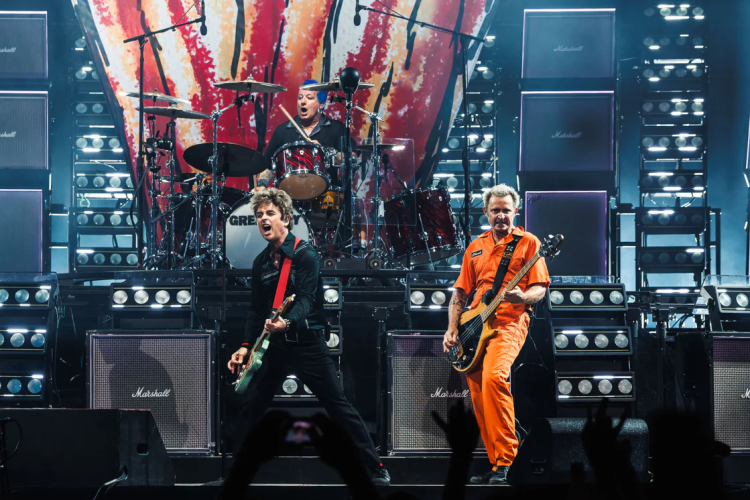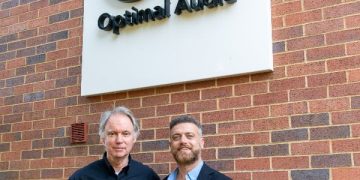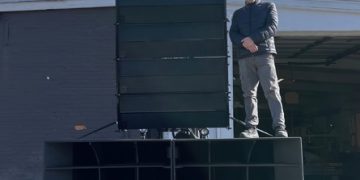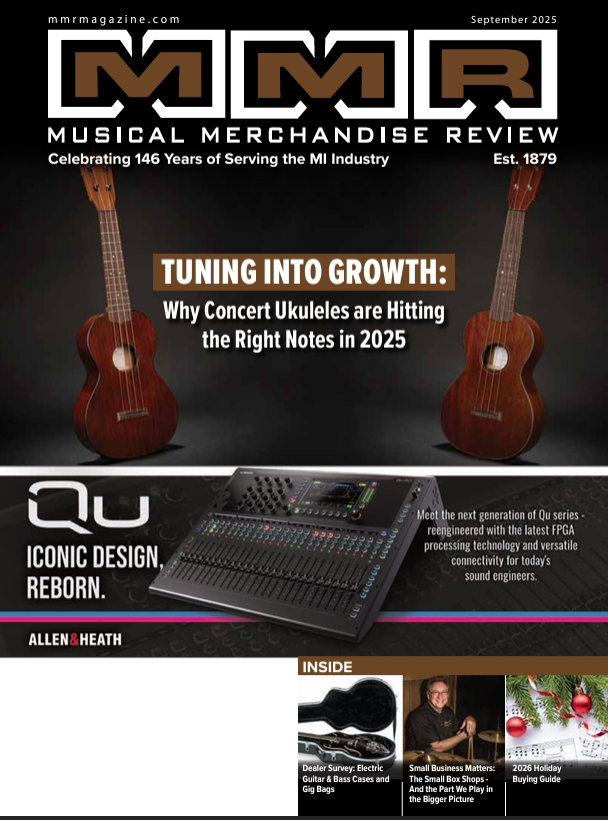Since forming in the late-1980s East Bay Area punk scene, Green Day have gone on to rack up over 70 million in record sales, win multiple Grammy Awards and stage one of their most successful albums, American Idiot, as a Broadway production. The power trio — frontman Billy Joe Armstrong, bassist Mike Dirnt and drummer Tré Cool — now routinely play to crowds of 80,000 or more at festivals, arenas and stadiums worldwide. Whatever the size of the venue, Schoeps microphones play a critical part in the band’s live sound in two key spots.
“Billy Joe wants to hear the crowd sing his songs back to him all night,” says Danny Badorine, Green Day’s monitor engineer for the past 18 months. He uses eight Schoeps MiniCMIT miniature shotgun microphones at every show to capture the energy of the audience for the lead singer and guitarist. “Those Schoeps mics are among the most important inputs on the entire stage for me. They’re on a console VCA and when we do a two-and-a-half-hour show my hand doesn’t leave that fader. The VCA fader is moving up and down 10 or 15 dB all night. I practically have carpal tunnel syndrome from those audience mics!”
When Badorine started with Green Day, having previously worked with Slipknot, Avenged Sevenfold and A Perfect Circle, he inherited 12 audience mics from the band’s previous monitor engineer. “But I cut out the other four mics because they were not even in the same ballpark. Once you use Schoeps, you can’t use anything else,” he says. “The MiniCMITs are so good at picking up the crowd.”
Schoeps MK 21 foundational for Tré Cool’s monitor mix
Another pair of Schoeps microphones, MK 21 wide cardioid capsules atop CMC 6 preamplifiers, play an equally critical role for drummer Tré Cool, providing the foundation of his in-ear monitor mix. “We have the overhead image and we individually mic every cymbal. The Schoeps pick up a stereo image of the drums, the snare sounds and tom sounds. That’s how he wants it, and it works for him,” Badorine explains. “Most overhead mics are bright. Good ones are clear. But these are three-dimensional and present. They are easily my favorite overhead mics I’ve ever used on a drum kit live.”
Cool is particular about his monitor mix and has a discerning ear, reports Badorine, who enjoys being challenged by the drummer. “He will say, ‘The ride cymbal’s interfering with the guitar.’ I’ll listen, do a little EQ, and he’ll say, ‘Yeah, that’s it.’ He hears everything. He’s demanding, but for the right reasons. He knows what he’s talking about but he’s not unreasonable about it.”
Badorine rarely uses drum overheads except when a drummer requests them for their monitor mix. “In fact, I just did a front-of-house gig the other day and I didn’t use overheads.” That said, with Green Day, the overheads sometimes get fed into other mixes. “I even use them somewhat for Billy, because sometimes Tré is talking or he’s slapping sticks for cues,” he says. “So I put them in the mix, which I don’t normally do for a singer, but they work. A little high pass filter and you’re good to go.”
Bringing the crowd into the mix with MiniCMIT
Badorine uses three MiniCMIT shotguns on either side of the stage to pick up the crowd, panned left and right in pairs according to their positions, with two more MiniCMITs on the downstage edge of the thrust panned closer to the center. The mics are carefully positioned to avoid picking up any of the front fill speakers. Badorine rolls the mics off at 500 Hz or 600 Hz, so there is no leakage from the subwoofers. “I want to be 20 to 30 feet away from the crowd with the mics,” he says. “The two downstage ones are closer, but they can’t get too close to people. I’ll turn that pair up or down depending on how loud the crowd is screaming. The rest of them just pick up a big crowd mage.”
The crowd mics are what help him keep his job, he laughs. “The guy who was mixing monitors before, who set me up for success, called me for the gig. He said, ‘Hey, man, the gig is audience mics.’ I’ve learned the cues; I know the singalong spots. There are other cues, but the guys are pretty easy — Billy’s going to look at you and ask for his vocal up or down, and he wants the crowd.”
Armstrong will taunt the crowd, telling one side that they are louder than the other. “It’s pretty cool,” Badorine says, but only a few people hear it. “Billy Joe hears it. I hear it. My tech hears it. Nobody else knows the magic of what’s going on. When it’s their crowd and they sing along, you go, ‘Whoa!’ With the Schoeps mics, you can hear it moving. It’s spatial, it’s three-dimensional.” He has independent control of each crowd mic and has them spread out on his console. “If somebody is whistling, I can turn that mic down. The Schoeps are massively important. I couldn’t imagine doing it with another mic.”
SCHOEPS Microphones
Founded in 1948, Schoeps Microphones are pioneers in the world of pro-audio with a reputation as one of the world’s finest manufacturers of microphones. The family-owned business, based in Durlach, Karlsruhe, Germany, designs and manufactures all of its products in-house with a team of 50 employees. The company is driven by a passion for innovation, technical excellence, and strong relationships with the creative and technical professionals who have made Schoeps a part of their daily workflows.
























